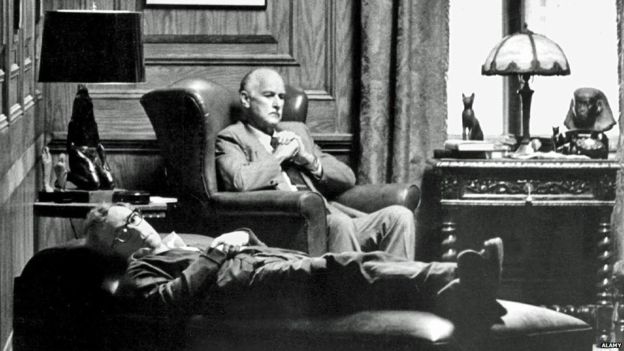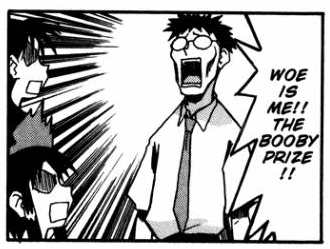The Magical Power Of “So What?”

Committed Action In Acceptance and Commitment Therapy
I cringe at myself every time I ask a client to “tell me about your childhood. ”
As a psychotherapist, it’s a legitimate question, but it’s so bloody stereotyped!
It reminds me of one of my favourite tracks as a kid – “Hyperactive” – by Thomas Dolby.
Now, I don’t have a Therapy couch and I don’t look as crazy as the shrink in the video. Rarely do my clients burst into song when I enquire about their upbringing. I do, however, have to work hard not to ask that question in a German accent.
So why do we counsellors and psychotherapists ask this question?
Because it’s useful.
Pragmatic Truth
In Acceptance and Commitment Therapy, we use the concept of Pragmatic Truth.
This states, if a thought is useful, go with it. If it’s not, defuse from it.
Defusion is a way of you separating from your thought. (Read this post to find out more).
Exploring your childhood in therapy is sometimes useful.
It can help you make links between the survival behaviours you learnt in childhood to keep yourself safe and your current behaviour.
Often, the things we learnt to do as a kid worked then but don’t work now – they cost us something long term.
Let me give you a personal example of that.
When I was a child, it was hard for me to predict the mood my Mum would be in.
Sometimes she would be fine, sometimes she was pissed off about something and very reactive.
Cue survival behaviour from me – stay away from her (mostly in my room playing Thomas Dolby records. And Queen. I loved Queen).

Clever me – this worked. Far less bollockings for me. Given how successful this strategy was I did it more and rarely ventured out from those four walls unless it to go over to Nicolas Mawer’s house to play on his ZX Spectrum. The pull of Jet Set Willy was strong.
Apply Old Behaviour To Today
My spider sense detects that my other half is not in a good mood – I know how to handle that! Run Away!
It pisses her off when I disappear, which is confusing to me as this strategy always used to work.
Hmm, I seem telling you about my childhood…
Anyway,
All this is very interesting darling, but so what?
Whilst it can be intriguing to see the links between childhood and adulthood, it’s no use at all if my behaviour doesn’t change.
Committed Action in Acceptance and Commitment Therapy
Committed action is where you do something that will take you towards your values even though that thing may cause uncomfortable feelings.
In the example above, I now commit to staying present with my partner if she is annoyed, even though that makes me feel anxious.
I do that because I love her and I value close connected relationships.
Harville Hendrix, the great couples therapist and co-founder of Imago Relationship Therapy, sees things this way. In the interview I did with him in May 2019, he said about couples:
“Imago moved from understanding to action. This is where we went beyond insight which doesn’t necessarily change you.
What changes you is when you behave differently in the next interaction with your partner. That’s what changes you, and you can understand all you want to about your past, but unless you change what you’re doing, then you don’t change because your memory needs an experience to record.”
“So What?” Is Not To Dismiss Your Pain
Now there is a danger here that you might think I’m suggesting that whatever happened in your childhood is not important and you should “get over it”.
That’s not what I’m saying at all. In fact, I’d encourage you to do the opposite.
I think it’s important for you to develop a deep compassion for yourself and grieve the loss of what you missed out on in childhood.
That could be closeness, connection, safety, fun, joy – all of these things, you should have had provided to you when you were little.
The Booby Prize

What I want you to hear is that having a 100% clear understanding of why you are as you are is no use at all if you stay stuck. It’s the booby prize.
I want you to be your best, most awesome self living a rich, fulfilling life.
To do this, there’s a couple of steps you will have to take, if you are willing:
1) Identify what a fulfilling life looks like to you. In Acceptance and Commitment therapy, we call this values based living.
2) Take slow and steady steps to getting there even though this may sometimes result in uncomfortable feelings. Uncomfortable feelings are the result of you going against the survival behaviours you put in place as a child. In ACT, we call this committed action.
My job as a counsellor in Cheadle is to help you do both steps because it’s bloody hard to do it on your own.
If you choose to work with me please forgive me if, during this process, I ask you to “tell me about your childhood.” And feel free to pull me up if I say it in a German accent!
Read the book.
A good book to read on Acceptance and Commitment Therapy is The Liberated Mind, by Steven Hayes. (affiliate link). Hayes is one of the co-founders of ACT and explains how he created ACT through his own experience of panic attacks. There’s a whole chapter on committed action as it’s key to moving towards what’s important.
Learn more about ACT
If you want to learn more about ACT, whether you’re a therapist or not, you can do my online course which will take you on a journey through the core components of Acceptance and Commitment Therapy whilst inviting you to use your own stuff to explore the model.
